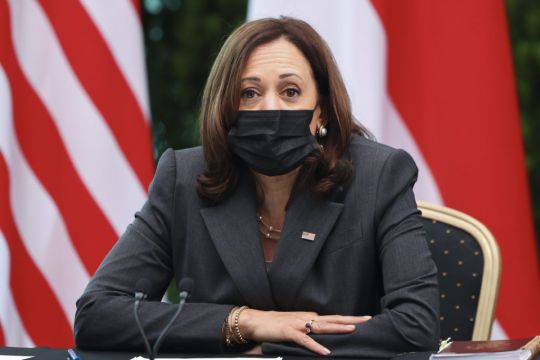The United States will provide an additional one million coronavirus vaccine doses to Vietnam, American vice president Kamala Harris has announced.
The move offers additional aid to a country currently grappling with a fresh coronavirus surge and stubbornly low vaccination rates.
Ms Harris, speaking after a bilateral meeting with Vietnamese prime minister Pham Minh Chinh, said that the doses would begin to arrive within the next 24 hours.

That brings the total vaccine donation from the US to Vietnam to six million jabs.
The new coronavirus aid is part of a wide-ranging set of announcements on new partnerships and support for Vietnam delivered to coincide with Ms Harris’ visit to the nation, as part of her week-long diplomatic mission to south-east Asia.
The trip, which included a journey to Singapore earlier in the week, is aimed at strengthening US relationships in the Indo-Pacific region to counter Chinese influence there.
During her meeting with Vietnamese president Ngyuen Xuan Phuc, Ms Harris also expressed support for sending an additional US coast guard cutter to Vietnam, to help defend its security interests in the South China Sea, and issued a sharp critique of Beijing’s incursions in the disputed waterway.

Ms Harris said: “We need to find ways to pressure and raise the pressure, frankly, on Beijing to abide by the United Nations Convention on the Law of the Sea, and to challenge its bullying and excessive maritime claims.”
She added that the US would “maintain a strong presence in the South China Sea” to challenge China.
And Ms Harris embraced elevating the relationship with Vietnam from a comprehensive partnership to a strategic partnership, a diplomatic designation that would reflect the deepening relationship between the two former foes.
Her comments follow sharp words towards Beijing during a speech in Singapore on Tuesday, where she said China’s actions in the South China Sea amount to “coercion” and “intimidation”.
The Biden administration is attempting to strengthen its alliances in the Indo-Pacific region in an effort to counter China’s influence. Ms Harris’ trip there is aimed at broadening US engagement with both nations and affirming America’s commitment to the region.
Ms Harris, who is the first US vice president to visit Vietnam, told the nation’s president that “our relationship has come a long way in a quarter of a century”.

She also announced the launch of a new Centres for Disease Control and Prevention (CDC) south-east Asia regional office.
The new CDC office will be one of four regional offices globally, and it is focused on collaborating with regional governments on research and training to deal with and prevent global health crises.
The announcement comes as Vietnam is grappling with record high coronavirus infections in Vietnam driven by the Delta variant and stubbornly low vaccination rates in the country. The surge in cases prompted a recent lockdown in Ho Chi Minh City, the nation’s business hub and the epicentre of the latest outbreak.
Later, Ms Harris will join a health security event with the health ministers from the Association of Southeast Asian Nations group (ASEAN) and Papua New Guinea, where she will speak more about the launch of the CDC centre.

But even as Ms Harris hopes to keep her focus squarely on those key agenda items in Vietnam, her visit will be overshadowed by a recent security scare in Vietnam and the ongoing developments in the US exit from Afghanistan.
Her flight to Vietnam was delayed for hours on Tuesday afternoon after the vice president’s office was made aware of an investigation into two possible cases of the so-called Havana Syndrome in Hanoi, according to administration officials.
The Havana Syndrome is the name for a rash of mysterious health incidents first reported by American diplomats and other government employees in the Cuban capital, beginning in 2016.
Ms Harris has yet to comment publicly on the developments, but they will weigh heavily on officials while she participates in a lease signing for the US embassy in Hanoi, with embassy staff attending.
And her visit to Vietnam is certain to draw some unwanted comparisons between the humiliating withdrawal of US troops in 1975 and the tumultuous effort this week to evacuate Americans and their allies from Afghanistan.







